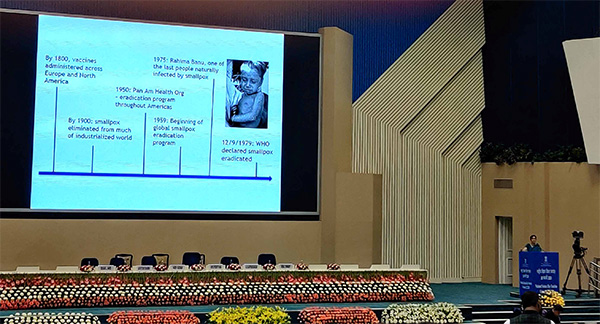Professor Gagandeep Kang, the first women FRS from India, delivered a special talk on Preparedness, Response, and Research when Epidemics and News go Viral on the occasion of National Science Day, which was celebrated with the Focal Theme Women in Science at Vigyan Bhawan, New Delhi. The National Science Day celebration was organized by Department of Science & Technology.
Professor Kang, Executive Director of the Translational Health Science and Technology Institute (THSTI), an autonomous institution of the Department of Biotechnology, highlighted the role women play in health care. “About 75% of the health care community is made up of women, and women play a great part of health care responders,” she said.
Elaborating on the drivers that spread epidemics, she said, “Today’s world is deeply connected, and people are in direct contact all the time. In such a scenario, epidemics are and will continue to become more frequent, more complex, and harder to prevent and contain. Current demographic transitions--driven by population growth, rapid urbanization, deforestation, globalization of travel and trade, climate change and political instability have fundamental effects on the dynamics of infectious diseases. She said that in a changing world, these drivers ensure that pathogens can and will cross barriers and spread in increasingly unpredictable ways, and to contain these preparedness and prevention are better for controlling epidemics.
Dr. Kang pointed out how, in the last twenty years, the SARS, MERS, Ebola, and COVID-19 outbreaks have shown that our concept of epidemics must evolve from crisis response during individual outbreaks to an integrated cycle of preparation, response, and recovery. “For rapidly evolving, high-impact events, preparedness, and collaborations designed and defined ahead of the outbreak are essential to bring together communities, responders, and researchers who do not currently interact,” she mentioned.
“Preparation, as with platform technologies for vaccines and diagnostics for sharing data and samples, sequencing and capacity for new diagnostics, can be key drivers of rapid innovation for tools to protect our populations,” she added further.
She highlighted about the international Coalition for Epidemic Preparedness Innovations (CEPI), a public-private coalition which is working by coordinating resources of academia, industry, and governments, prioritizing platform technologies and facilitating advanced developments for emerging infectious diseases to derail epidemics by speeding up the development of vaccines.
She emphasised that confidence in our health systems, our agencies, and our scientists is vital, which is enhanced by working together to protect our people, advance science, and enable the development of technologies to protect the world.
She cited the successful example of MenAfrivac, a vaccine developed by India which completely eradicated the Meningitis disease from Sub Sahara Africa and said that “We have a lot to be proud of but a lot more to do.”
Professor Kang has served on the scientific advisory of several national and international institutions, including the World Health Organization, Wellcome Trust, International Vaccine Institute, and International Center for Genetic Engineering and Biotechnology. She currently chairs the Immunization Technical Advisory Group of the WHO Southeast Asian Region. She is Vice-Chair of the Board of the Coalition for Epidemic Preparedness Innovations, a global partnership seeking to proactively develop vaccines for epidemics.
Professor Kang has built strong inter-disciplinary research programs on enteric infections, nutrition, and child development. She is internationally recognized for her contributions to vaccine development for rotavirus and vaccine policy. Her work has been recognized through several awards and, most notably, the Infosys Prize in Life Sciences. In 2019 she was the first Indian woman elected as a fellow of the Royal Society.































